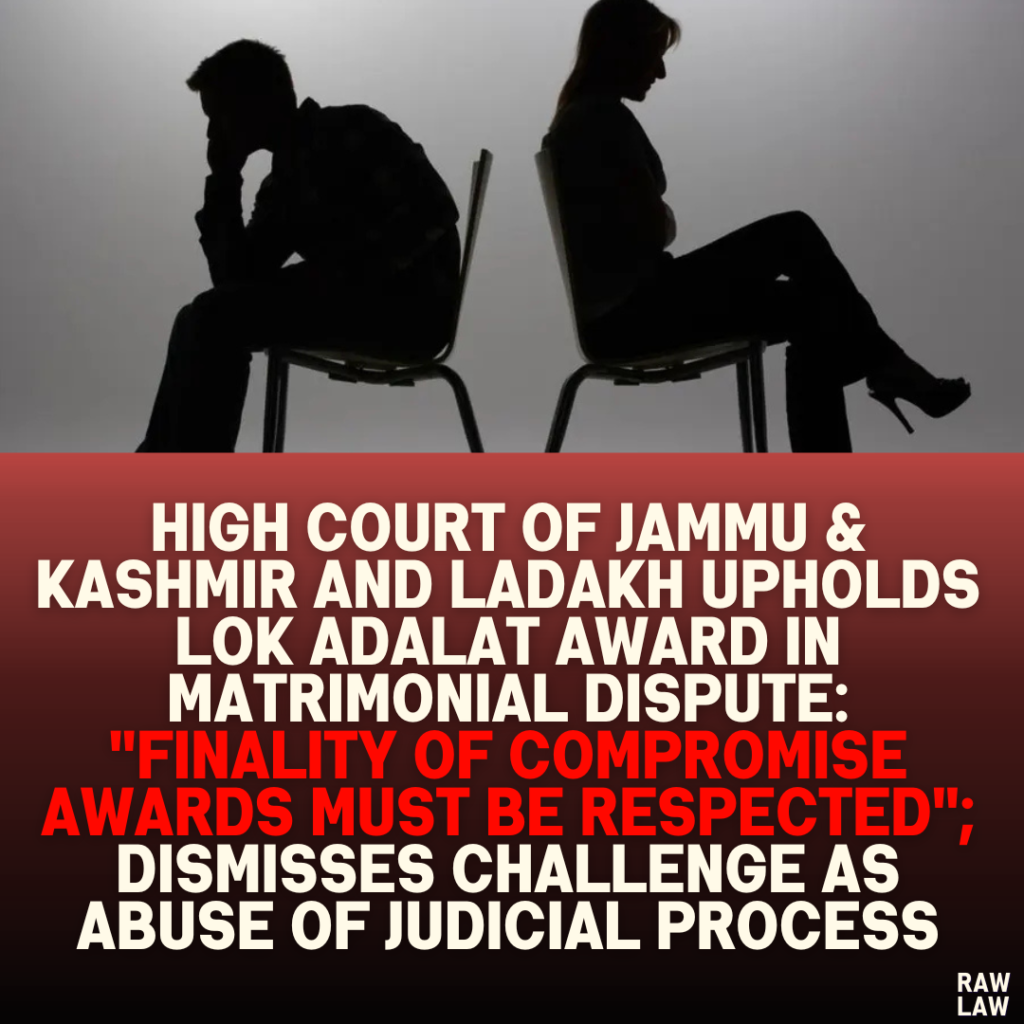Court’s Decision
The High Court of Jammu & Kashmir and Ladakh dismissed three connected petitions challenging the award passed by the National Lok Adalat at Pulwama. The court held that the compromise deed executed between the petitioner (husband) and respondent (wife) was valid, binding, and carried the force of a civil court decree under Section 21 of the Legal Services Authorities Act, 1987. The petitions were found to be devoid of merit and dismissed.
Facts
- The dispute originated from a matrimonial conflict between the petitioner and his wife, who had two daughters from the marriage. The wife filed a petition under Section 488 of the Criminal Procedure Code, seeking maintenance for herself and the children.
- A compromise deed was signed on February 10, 2018, during proceedings before the National Lok Adalat. The petitioner agreed to pay a lump sum of ₹7 lakhs, transfer 10 marlas of land, and pay monthly maintenance of ₹3,500 for the daughters. He also agreed to grant a divorce to his wife.
- Subsequently, the petitioner challenged the validity of the compromise deed, claiming coercion and misrepresentation, while the wife initiated execution proceedings to enforce the Lok Adalat award.
- The petitioner approached the High Court under Article 227 of the Constitution, challenging the execution proceedings and the compromise deed.
Issues
- Whether the compromise deed executed before the Lok Adalat was legally valid and binding.
- Whether the trial court could execute the Lok Adalat award when the petitioner had filed appeals against it.
- Whether the detention of the petitioner for non-compliance with the award was lawful.
Petitioner’s Arguments
- The petitioner alleged that the Lok Adalat award was obtained through coercion and that he was not fully aware of the compromise terms.
- He argued that the execution of the award was premature, as its validity was being contested in higher courts.
- He claimed that the trial court’s detention order for non-payment of the maintenance amount was an abuse of judicial power and violated due process.
- The petitioner contended that the award imposed disproportionate obligations on him, causing undue hardship.
Respondent’s Arguments
- The respondent (wife) argued that the petitioner was trying to evade his responsibilities under the compromise, leaving her and her daughters in financial distress.
- She asserted that the compromise deed was executed voluntarily in the presence of legal counsel representing both parties.
- The respondents emphasized that the award, being final under Section 21 of the Legal Services Authorities Act, was binding and enforceable, and the petitioner’s repeated legal challenges amounted to abuse of judicial process.
- They highlighted that the petitioner’s attempts to avoid payment defeated the purpose of maintenance laws, aimed at preventing destitution of dependents.
Analysis of the Law
- Section 21 of the Legal Services Authorities Act, 1987:
- The court underscored that awards by Lok Adalats are equivalent to decrees of civil courts, final and binding on all parties. These awards cannot be appealed but may only be challenged before the court that passed them, by proving invalidity or illegality.
- The statute ensures that settlements reached through Lok Adalats, conducted on principles of equity and natural justice, have conclusive authority.
- Precedent – Pushpa Devi Bhagat v. Rajinder Singh (2006):
- The Supreme Court ruled that a compromise decree cannot be appealed. Instead, a party seeking to void such a decree must demonstrate its illegality or invalidity before the issuing court.
- Good Faith in Judicial Proceedings:
- The court criticized the petitioner for suppressing material facts and engaging in repeated litigation to delay compliance, which it termed as an abuse of process. It emphasized the principle that litigants must approach the court with clean hands.
Precedent Analysis
- The court reaffirmed the precedent set in Pushpa Devi Bhagat, clarifying that Lok Adalat awards are binding and enforceable unless proven invalid.
- It emphasized that the compromise deed was executed with the petitioner’s full knowledge and consent, as corroborated by his legal counsel.
Court’s Reasoning
- Voluntary Nature of the Compromise:
- The court rejected the petitioner’s claim of coercion, noting that he was represented by counsel during the Lok Adalat proceedings. His counsel confirmed the petitioner’s awareness of the terms.
- The petitioner’s signatures on the compromise deed and the statement of his counsel eliminated any doubt regarding the deed’s authenticity.
- Binding Effect of Lok Adalat Awards:
- The court emphasized that the award had the force of a civil court decree under Section 21 of the Legal Services Authorities Act.
- It held that the petitioner’s actions were aimed at delaying enforcement and evading responsibilities, causing hardship to the wife and daughters.
- Abuse of Process:
- The court observed that the petitioner’s repeated legal challenges and suppression of material facts amounted to an abuse of the judicial process, warranting dismissal of the petitions.
Conclusion
The High Court dismissed all connected petitions, upheld the Lok Adalat award, and directed the trial court to proceed with its execution. It vacated interim orders staying enforcement of the award. The court reiterated the finality and binding nature of Lok Adalat awards.
Implications
- Reaffirmation of Lok Adalat’s Authority:
- This judgment reinforces the finality of Lok Adalat awards, promoting speedy and amicable resolution of disputes.
- It underscores the significance of voluntary settlements in reducing litigation backlog.
- Deterrence Against Frivolous Litigation:
- The decision discourages repeated challenges to valid compromise awards, ensuring judicial resources are not wasted on frivolous petitions.
- Upholding Maintenance Rights:
- The court’s reasoning highlights the importance of protecting the rights of dependents under maintenance laws, ensuring financial stability for vulnerable family members.
This judgment serves as a strong endorsement of alternative dispute resolution mechanisms and emphasizes the need for good faith and candor in legal proceedings.




Pingback: Delhi High Court: Non-Compliance with E-Way Bill Requirements Under Section 129 of the CGST Act Must Align with Proportionality and Legislative Intent; Procedural Breaches Without Fraudulent Intent Cannot Attract Disproportionate Penalties - Raw Law